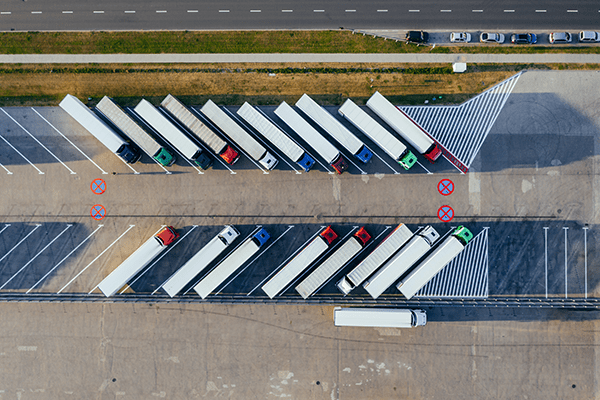It’s the RHA’s National Lorry Week this week, and lorries have never been more of a media hot topic, while drivers have never been more in-demand. In this blog we discuss what’s currently going on in the world of British lorries.
Empty Shelves and Christmas Chaos
Unless you’re living under a rock, you’ll have already started noticing stress in the UK’s logistics system. Particularly in our supermarkets and pharmacies, where partially empty shelves are quickly becoming the norm.
“Modern supply chains are really complex, they rely on a lot of moving parts, a lot of labour supplies, lorry drivers. And if one of those bits doesn’t quite work or if several of them don’t work, you will get shortages and that is what is happening. And it’s quite possible that is going to continue for quite a while to come. This is COVID, this is Brexit.”
A perfect storm of problems has left the UK particularly hard-hit by driver shortages right now. And the situation is probably going to get worse before it gets better! It’s the end of October, which means, as an industry, logistics is about to get busy for the festive season. It’s likely that there will be shortages this Christmas in the UK, and lack of HGV drivers is a key factor in this.
The Fuel Crisis
The perfect example of what can happen without enough HGV drivers has just occurred in the UK this September. Of course it was massively blown out of proportion by panic buyers, but at the heart of the fuel crisis was a shortage of lorry drivers. And after the panic buying wave, the slower re-stocking caused serious issues UK-wide, with hours long queues to get to petrol stations and multiple industries struggling to meet their usual standards.
In fact, this fuel crisis was a logistics crisis catalysed by media hype. There was a slight dip in fuel supply, panic buying set in, and the logistics couldn’t keep up with demand because, you guessed it, we are short on lorry drivers!
Brexit & EU Drivers
As so much of our produce is imported – from the EU in particular – it’s no surprise that EU workers form a substantial percentage of the HGV drivers across the UK… until recently.
When the UK voted to leave the EU, many EU nationals decided to leave too – some of these were HGV drivers. This added a small amount of stress to an industry which was already seeing a shortage of labour and drivers leaving the profession due to poor working standards.
But then, as the Pound weakened against the Euro, a lot of the remaining EU drivers have opted to take work across Europe rather than return to the UK. This is because many drivers get paid by the mile / kilometer, and any hold up, technically, costs them money. Brexit, border checks and the associated red tape can use up valuable time for drivers. So EU HGV drivers are, all around, better off staying out of the UK. Plus demand is high across the EU too, so there is little incentive to return to driving in the UK.
This issue was anticipated and the Government was warned. There is now a shortage of over 100,000 HGV drivers across the UK. The RHA have a helpful tool for you to contact your MP calling for action to resolve the HGV driver shortage. Simply add your postcode and the automated letter is ready to be emailed to your MP – of course you can edit this if you wish to.
…But It’s Not Just Brexit
The pandemic was another factor in foreign drivers’ decisions to leave the UK, preferring to be in their home countries with their family in such an uncertain climate.
The pandemic also created unprecedented levels of demand for our logistics networks in two key ways; firstly more goods than expected needed to be moved (think PPE, medications, cleaning supplies) leading to increased and urgent demand, and secondly the requirement to isolate during an active Covid-19 infection, or after contact with a confirmed case, or quarantine periods took drivers off the road.
On top of that, we’ve seen a lot of UK HGV drivers leaving the profession too, thanks to a piece of HMRC legislation called IR35. With so many drivers being self-employed, IR35 has hit hard. Essentially, if ‘caught by’ IR35 (basically if IR35 is found to apply to an individual), a worker is considered an ‘employee’ for tax purposes. Meaning their income is taxed higher, in-line with an employed worker, but they have no pension contributions, sick pay or benefits, and they can’t claim their expenses like travelling to work – typical for a self employed worker. Self employed workers try to find a balance in paying less tax but covering their own pension, expenses and benefits. IR35 reform came into full effect in April 2021 (BAD timing!), and so a lot of HGV drivers, and other self employed contractors, have changed occupations.
Working conditions are also to blame for the lack of uptake, as well as the mass exodus, of professional British lorry drivers from the profession. With poor pay, lack of facilities and long hours working away from home being the main reasons that drivers leave their jobs.
HGV Driving As A Career
Encouraging Brits to get behind the big-wheel is all well and good, but is there enough appetite to start a career as an HGV driver? And is it even possible to get people qualified and trained quickly enough?
The short answer is ‘no’. Currently prospective HGV drivers have to take lessons for at least a few weeks (depending on how quickly they learn), book a test for a Class C (rigid lorries) test, pass it, then wait 2-3 weeks before taking a Class E (articulated lorries) and pass it. If the driver passes (current pass rate is 56%) they will then be ‘buddied up’ with another driver for approximately 8-10 weeks to properly train for the job.
The Government is planning to allow drivers to take their Class C and E tests together, which saves a few weeks, but the newly qualified drivers will still require an 8-10 week period ‘buddied up’ before going out on the road alone. So if we add up learning, test taking, and on-the-job training we get a minimum of 15 weeks to get a new driver out on the road. With the industry stretched to breaking point now, and the festive rush ramping up in November, we are basically out of time.
The Government’s plans to make the process simpler and easier will open up the space to test 3,000 HGV drivers per week. With current pass rates that equates to an extra 1,600 drivers per week. But we’re currently losing around 600 drivers per week total. So rough calculations suggest this long-term strategy will take 2 years to relieve the pressure.
We already have a shortage of around 100,000 HGV drivers, and there is no way that simplifying the qualification process is going to provide the short-term fix we need.
Solutions Being Put In Place
In addition to the above, potentially, hazardous plan to put newly qualified drivers onto the roads alone sooner, there are other strategies being introduced.
Some have suggested the quickest way to relieve pressure is to grant emergency visas for HGV drivers, and the UK Government has been hesitant to go ahead with this, instead telling UK businesses to hire British citizens. Finally, the fuel crisis was the nudge the Government needed to grant emergency visas but they’re only granting 5,000; a move that has come under heavy criticism from the industry.
And announced this week, was the plan to allow foreign delivery drivers more time within the UK – at the present time overseas drivers can do a few limited trips within the country, the plan is to extend this and allow them a 2-week period within the country to complete haulage jobs.
Again, this has come under heavy criticism, with HGV drivers finally seeing a much deserved pay rise due to demand, possibly now facing being undercut for work by overseas drivers who may accept a lower fee.
IT seems the Government is putting a ‘band aid on a broken leg’, these temporary, short-sighted measures will help ease pressure. But they certainly aren’t addressing the real issues here.
Drivers Aren’t Happy
Drivers are working longer hours, they are stressed, they have kept us going through a pandemic – and a pandemic complicated by Brexit and a fuel crisis at that – but they are feeling the strain.
If the drama of the past 18 months can teach us one thing, it’s that HGV drivers are an essential cornerstone of the lifestyle we’ve all come to enjoy. They supply us with food and necessities, they can work long hours away from their families, and they are a dying breed unless we act now. For the service they provide they should be paid well, looked after by the Government and respected as skilled professionals.
If you’d like to help, please contact your local MP. You can also check out all the action, activities and news by following #NATIONALLORRYWEEK on Twitter.

